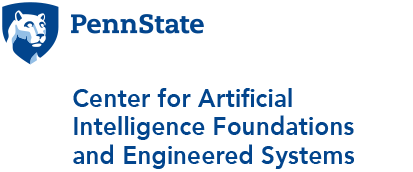Alan Wagner
AI Related Expertise Topics
My research borrows heavily from social psychology, behavioral economics, and artificial intelligence focusing on higher, cognitive, aspects of human-robot socialization such as relationship development, modeling of one’s interactive partner, and reasoning about trust and deception. I utilize theories and methods from these fields to create robots that are capable of social interaction with an ordinary person in variety of different environments. My work has focused on the development of a framework based on social psychological and game theory that allows a robot to computationally represent its social interactions with a human. This framework has, in turn, led to insights into higher social phenomenon such as trust, deception, and stereotyping as well as computational methods that allow a robot to reason about whether a situation demands trust or warrants deception. With respect to applications, my primary interest lies in the areas of healthcare and search and rescue. My research on human-robot trust has, for example, focused on emergency evacuation scenarios in which a person must decide whether or not to follow a robot’s evacuation directions. Overall, my research strives to positively influence both the development of interactive robot and the people that choose to use those robots.
Externally Funded AI Projects
- CAREER: No Time to Explain: Developing Robots that Actively Prevent Overtrust during Emergencies, National Science Foundation, $500,000 over 3 years. $500,000 my portion. Wagner, A.R. (PI).
- Toward Cognitive Realism in Game Theoretic Models of Social Behavior, Air Force Office of Scientific Research, $905,185, 455,000 my portion, Wagner, A.R. (PI) and Rajtmajer, S.
- Trust in Machine Agents Under Realistic Threat, Air Force Office of Scientific Research, $363,074 over 3 years, $363,074 my portion, Holbrook, C.(PI) and Wagner, A. R.
- S&AS: INT: COLLAB: Do the Right Thing: Competing Ethical Frameworks Mediated by Moral Emotions in Human Robot Interaction, National Science Foundation, $900,000 over 3 years. $400,000 my portion. Wagner, A.R. (PI).
- FW-HTF-RM: Collaborative Research: Future of Construction Work at the Human-Technology Frontier, National Science Foundation, $698,525 over 3 years. $233,000 my portion. Investigators: Leicht, R. (PI), Mohammed, S., Wagner, A.R.
- STTR: Real-Time Validation of Machine Intelligence Controlling Unmanned Vehicle Autonomous Operations, Office of Naval Research-Verus Corp., $66,970 over 6 months. $66,970 my portion. Wagner, A.R. (PI).
- NRI: INT: COLLAB: Interactive and collaborative robot-assisted emergency evacuations National Science Foundation, $1.5M total over 4 yrs. $502,231 my portion. Investigators: Wagner, A.R. (PI), Zhu, M., and Lin, H.
- Developing human-machine systems that actively calibrate a user’s trust, Air Force Office of Scientific Research, $762,799 total over 4 yr. $381,415 my portion. Investigators: Wagner, A. R. (PI) and Howard, A.
- Trust and Trustworthiness in Human-Robot Interaction: A formal Conceptualization, Air Force Office of Scientific Research Young Investigator Program, $360,000 total for 3 yrs. $360,000 my portion. Investigator: Wagner, A.R. (PI)
- Adaptive Turn-taking Routines for HRI via Stereotype Models, Office of Naval Research Office of Naval Research, $525,000 over 3 yrs. $262,500 my portion. Investigators: Thomaz, A. (PI) and Wagner, A.R.
- Object Recognition for Stereotype Learning in Human-Robot Interaction, Naval Surface Warfare Center, Crane, $20,000 over 1 yr. Investigators. Wagner, A. R. (PI)
AI-related Courses
- ENGR 467 Robots and their Role in Society
Webpage
Multimedia
See our webpage.
Publications
- Jois, H., & Wagner, A. R. What Happens When Robots Punish? Evaluating Human Task Performance during Robot-Initiated Punishment. Transactions on Human-Robot Interaction. [Accepted May 30, 2021].
- Wagner, A. R. [Review of the book Human-Robot Interaction: An Introduction]. Journal: Prometheus: Critical Studies in Innovation, 3 pp. [Accepted March 2021].
- Wagner, A. R., & Robinette, P. (2020). An Explanation is not an Excuse: Trust Calibration in an Age of Transparent Robots. In Joe Lyons, Chang Nam (Eds.), Trust in Human-Robot Interaction (pp. 17). Elsevier.
- Bartneck, C., Lütge, C., Wagner, A. R., & Welsh, S. An Introduction to Ethics in Robotics and AI. Springer.
- Ayub, A., & Wagner, A. R. Boundaryless Online Learning of Indoor Scenes by Pepper. Proceedings of the 2021 IEEE International Conference on Intelligent Robots and Systems (IROS). [Submitted April 1, 2021].
- Ayub, A., Fendley, C., & Wagner, A. R. CBCL-PR for Few-Shot Incremental Learning. Proceedings of the 2021 IEEE International Conference on Intelligent Robots and Systems (IROS). [Submitted April 1, 2021].
- Mokhtari, K., & Wagner, A. R. Don’t Get Yourself into Trouble! Risk-aware Decision-Making for Autonomous Vehicles. 2021 IEEE International Conference on Intelligent Transportation. [Submitted March 23, 2021].
- Ayub, A., Hu, H., Zhou, G., Fendley, C., Ramsay, C., Jackson, K. L., & Wagner, A. R. College Students Cheating on a Collaborative Task with a Social Robot:The Roles of Cheating Exposure and Task Clarity. Proceedings of the 30th IEEE International Conference on Robot and Human Interactive Communication (RO-MAN). [Submitted April 2021].
- Jois, H., & Wagner, A. R. How Humans Respond to Punishing Robots in a Virtual Experiment. Proceedings of the 30th IEEE International Conference on Robot and Human Interactive Communication (RO-MAN). [Submitted April 2021].
- Surendran, V., & Wagner, A. R. Can’t hide your disappointment: Using human pose and facial cues for intent prediction in a target game. Proceedings of the 2021 IEEE International Conference on Advanced Robotics and its Social Impacts (ARSO). Held Virtually. [Accepted April 2021]. Best Paper Award Finalist.
- Nayyar, M., & Wagner, A. R. Aiding Emergency Evacuations Using Obstacle-Aware Path Clearing. Proceedings of the 2021 IEEE International Conference on Advanced Robotics and its Social Impacts (ARSO). Held Virtually. [Accepted April 2021].
- Ayub, A., & Wagner, A. R. F-SIOL-330: A Robotic Dataset and Benchmark for Few-Shot Incremental Object Learning. Proceedings of the 2021 IEEE International Conference on Robotics and Automation (ICRA). Held Virtually (48.0% Acceptance Rate). [Accepted February 2021].
- Ayub, A., & Wagner, A. R. EEC: Learning to Encode and Regenerate Images for Continual Learning. International Conference on Learning Representations (ICLR). pp. 16. Held Virtually. (28.7% Acceptance Rate).
- Jois, H., & Wagner, A. R. Castigation by Robot: Should Robots be Allowed to Punish Us? Proceedings of the International Association for Computing and Philosophy (IACAP) 2019. [In press - forthcoming July 2021]
- Mokhtari, K., Lang, K., & Wagner, A. R. Don't go that way! Risk-aware Decision Making for Autonomous Vehicles. The Twelfth International Conference on Social Robotics (ICSR). pp. 284-295. Held Virtually. 2020. (25% acceptance for oral presentation
- Nayyar, M., Zoloty, Z., MacFarland, C., & Wagner, A. R. Exploring the Effect of Explanations during Robot-Guided Emergency Evacuation. The Twelfth International Conference on Social Robotics (ICSR). pp. 13-22. Held Virtually. 2020. (25% acceptance for oral presentation).
- Ayub, A., & Wagner, A. R. Teach Me What You Want to Play: Learning Variants of Connect Four through Human-Robot Interaction. The Twelfth International Conference on Social Robotics (ICSR). pp. 502-515. Held Virtually. 2020 (55% Acceptance Rate).
- Ayub, A., & Wagner, A. R. Tell me what this is: Few-Shot Incremental Object Learning by a Robot. IEEE International Conference on Intelligent Robots and Systems (IROS). pp. 8344-8350. Held Virtually. 2020. (47% Acceptance Rate).
- Ayub, A., & Wagner, A. R. What am I allowed to do here?: Online Learning of Context-Specific Norms by Pepper. The Twelfth International Conference on Social Robotics (ICSR). pp. 220-231. Held Virtually. 2020. (25% Acceptance for oral presentation).
- Ayub, A., & Wagner, A. R. Centroid Based Concept Learning for RGB-D Indoor Scene Classification. The British Machine Vision Conference (BMVC). pp. 13. Held Virtually, 2020. (29.1% Acceptance Rate).
- Mokhtari, K., Surendran, V., Ayub, A., & Wagner, A. R. (2020). Pedestrian Density Based Path Recognition and Prediction for Autonomous Vehicles. IEEE International Conference on Robot and Human Interactive Communication (RO-MAN). pp. 517-524. Naples, Italy.
- Zare, M., Ayub, A., Liu, A., Sudhakara, S., Wagner, A. R., & Passonneau, R. Dialogue Policies for Learning Board Games through Multimodal Communication. Proceedings of the 21th Annual Meeting of the Special Interest Group on Discourse and Dialogue (SIGDIAL). pp. 339-351. 2020. eld Virtually. (39% Acceptance Rate).

Alan Wagner
Hartz Family Career Development Assistant Professor of Aerospace Engineering


